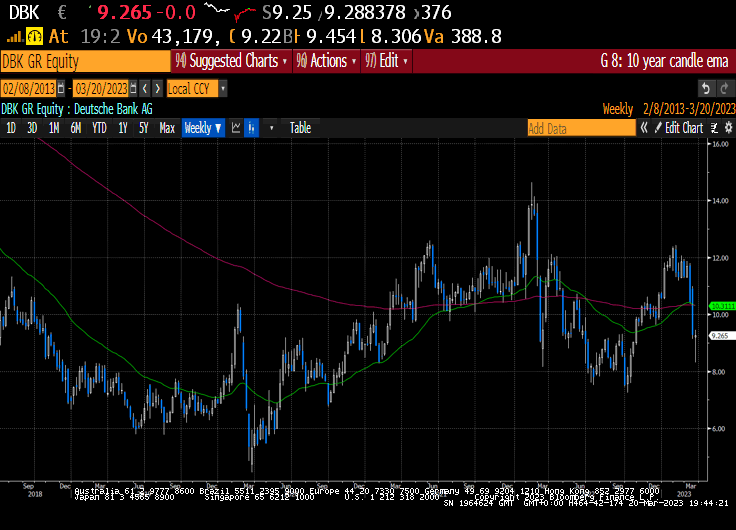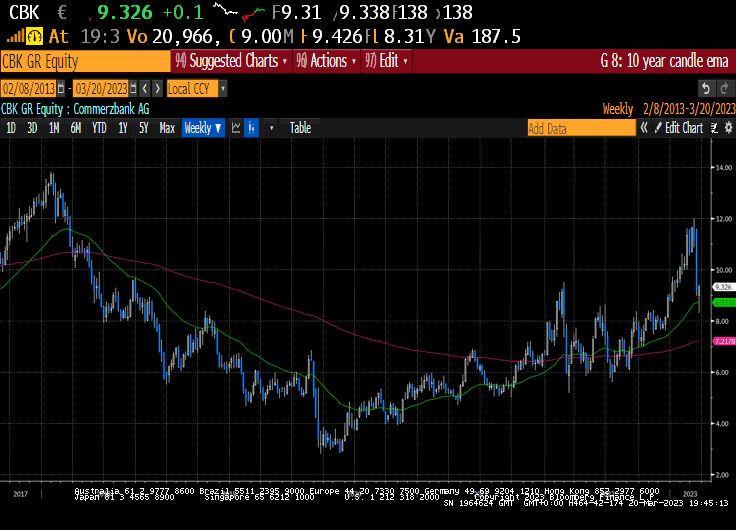Contagion Risk Spreads as CDS Market Puts Focus on Deutsche Bank
This article from Bloomberg may be of interest. Here is a section:
DB’s CDS has widened by virtually the same as UBS’s over the last month, even though it has not had to digest a rival with $575 billion in assets over a weekend.
Deutsche Bank’s revenues have fallen over most of the last decade, and the bank has faced questions around its governance, with BaFin, the German bank regulator, censuring it over its money-laundering controls. However, over the last two years the investment bank has spearheaded a recovery, with revenues and profitability improving.
Nonetheless, DB lagged the rebound seen in European bank shares that began last summer, while its price-to-book ratio remains subterranean.
Contagion risk is much lower than it was in 2008, but it is not zero. And contagion is not always fully logical: Credit Suisse’s tier 1 capital ratio was higher than DB’s.
No one reads prospectuses until they must. They are both long and boring, so file searches will now be underway to identify those with similar characteristics to the CoCos issued by Credit Suisse and UBS. Bond investors are not in the habit of being zeroed, and particularly so when the equity is still trading.
The challenge at present is contingent convertible bond issuance was popular in the last decade. This article from Wiley puts some numbers of the size of the market highlights the fact this is not the first time Deutsche Bank has been the focus on CoCo stress.
In a recent paper, Avdjiev et al. (2017) provide comprehensive empirical evidence about CoCos issuance by banks between January 2009 and December 2015. They find that banks around the world issued $521 billion in CoCos through 731 different issues, which is modest in view of the size of the bond market - estimated around $100.130 trillion in 2017 by the bank for international settlements (BIS, 2019) - but represents nonetheless a segment large enough to produce interesting data. But as no CoCo bond has yet been activated, their effectiveness remains hypothetical.
In January 2016, Deutsche Bank announced expected negative results. Uncertainty followed as investors feared that Deutsche Bank's CoCos coupons would not be paid. A few months later, in September 2016, the press reported that Deutsche Bank had received a huge fine from the US Department of Justice. These two events pushed the yield to maturity on Deutsche Bank's CoCos to historic highs and created market-wide stress, affecting all major European banks. This incident highlighted that an isolated disruption in the financial system could cause investors to suddenly fear systemic risks and flee from CoCos, destabilising the market and exacerbating the original problem but Bologna et al. (2020) suggest that such a contagion effect could be attributed to the lack of experience with this new instrument. Early 2020, the economic downturn caused by the SARS-CoV-2 pandemic brought additional turmoil to the market. Just 1 month after its first successful CoCo issue in 6 years in February 2020, Deutsche Bank has again announced that it will delay the repayment of $1.25bn of 6.25% CoCo debt. The value of the recently sold CoCo bond fell to around 50% of its face value. At the same time, investors tried to protect themselves from risks by buying massive amounts of CDS on the debt of Deutsche Bank and other banks. As a result, the global investment management firm Pimco saw its $8bn capital securities fund – which had CoCos as its top five holdings at the end of 2019 – fall by almost 13% over the past year.

Deutsche Bank’s stock rebounded off its intraday lows today and some unwinding of the short-term oversold condition is possible but credit is still tight so recovery is likely to be slow assuming the bank is not nationalised.

Commerzbank steadied today in the region of the 200-day MA.


